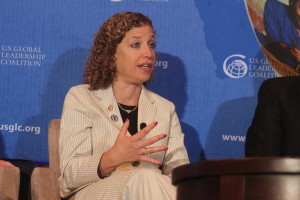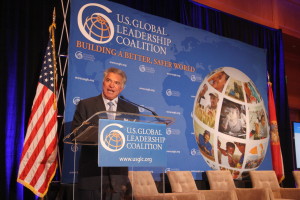
 Recently in Miami, DNC chair Debbie Wasserman Schultz and ACU chair Al Cardenas shared the same stage before an audience of nearly 400 Miami business and military leaders to emphasize the need for the U.S. to be more engaged in the world, not less, while raising clear benefits between international trade and Florida’s economy.
Recently in Miami, DNC chair Debbie Wasserman Schultz and ACU chair Al Cardenas shared the same stage before an audience of nearly 400 Miami business and military leaders to emphasize the need for the U.S. to be more engaged in the world, not less, while raising clear benefits between international trade and Florida’s economy.
This is a great example of the long legacy of bipartisan support for international affairs programs. From President Kennedy’s creation of the Peace Corps to President George W. Bush’s Emergency Plan for AIDS relief program (PEPFAR), Democrats and Republicans have supported innovative foreign assistance programs that create American jobs, protect our national security, and demonstrate our finest values as a nation. These two political titans coming together to support America’s international development and diplomacy initiatives speaks volumes about the importance for our economy, national security, and values when we take a leadership role in global affairs.
 With the stakes so high on the international stage, I suspect there will be more party and elected officials having an honest dialogue about how we shape our national security and economic policies to advance America’s interests.
With the stakes so high on the international stage, I suspect there will be more party and elected officials having an honest dialogue about how we shape our national security and economic policies to advance America’s interests.
As more and more crises emerge – from Ukraine to Syria – we need our elected leaders to demonstrate bipartisanship, assert our nation’s moral high ground and reassert our global leadership.
Those involved in politics know election years are difficult for leaders to work across the aisle for the good of the American people, and those in need around the world. Having been involved in several partisan campaigns, I know the temptation to let political differences cloud judgment of good policy.
Yet, there are some things that just rise above the political fray, and our leadership in the world is, and should be, one of them. As Republican Senator Arthur Vandenberg from Michigan once suggested “Politics stops at the water’s edge.”
There’s just too much at stake in the world for us to disengage now.